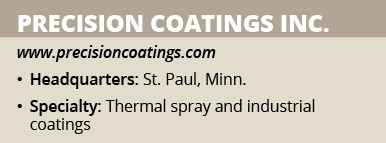Precision Coatings Inc.
Precision Coatings Inc. excels in its role as a Tier II supplier, and its niche offering highlights the entire supply chain’s importance.
Precision Coatings Inc. in St. Paul, Minn., is a small but seasoned provider of thermal spray coatings and PTFE non-stick, low-friction industrial coatings. The company offers full service supply and support to several Tier I companies in the United States and in Europe.
Precision Coatings’ primary business is applying specialty wear-resistant and corrosion-resistant coatings of metal, ceramic, and tungsten carbides, as well as other exotic metal alloys. The company also performs machining and grinding operations in–house and manages subcontract operations on machined parts to eventually sell a complete component to their customers.
The company even manages inventory based on a demand schedule for higher-volume contracts. Precision Coatings’ complete component supply streamlines its customers’ supply chain. The company is one source for a component that has three to five distinct processes.
The specialty coatings provided by Precision Coatings enhance components such as shafts, rollers and bushings. These components are used in high-performance assemblies for the diesel engine industry as well as in industrial pumps, commercial food processing equipment, emission control valves, gasoline storage systems, printing devices, and packaging/handling equipment. These coated components eventually become part of end-use products sold by some of the most well-known global brands.

Part of the Backbone
Precision Coatings’ niche product and service offering highlights the importance of the entire supply chain of any organization. The company’s role is reinforced by key points from a report published in March 2015 by the U.S. Department of Commerce and White House entitled “Supply Chain Innovation: Strengthening America’s Small Manufacturers,” which called America’s 230,000 small manufacturing firms “the backbone of U.S. supply chains.”
According to the report, manufacturers spend an average of 60 percent of the price of their final product on purchased inputs, so differences in the quality and nimbleness of their supply chains can make or break their ability to compete.
Large manufacturers have a critical role to play in cultivating the capabilities of small firms in their supply chains. By focusing on supplier quality and innovation rather than engaging in a race to the bottom on piece price, companies can send a strong market signal that stimulates innovation by small suppliers, thereby making the entire supply chain more competitive, the report adds.
An Increasing Role
Today, small manufacturers – defined as firms with less than 500 employees – employ 42 percent of all U.S. manufacturing workers, a steady increase of 10 percentage points over three decades.
During these past decades, vertical integration has become less common, with many firms focusing instead on a few core competencies and outsourcing other stages of production to suppliers. This shift toward networks of specialized suppliers has raised the importance of small manufacturers. Because of this increasing role in the overall manufacturing sector as members of tightly interdependent supply chains, their ability to keep up with and even lead advances in technology is critical to the competitiveness of U.S. manufacturing overall.
Evidence suggests there are two main practices that help firms promote supplier innovation, especially among small businesses in their supply chains.
The first of these practices is to offer suppliers assurance that they will receive a return on investments they make in new technologies and in upgrading their capabilities.
Investments in new capabilities and technologies are inherently risky, especially for small suppliers with tight margins and limited access to capital. Even informal assurance from larger partners that these investments are of sufficient value to receive a price premium and continued business can reduce the risk of the investment.
The second practice is to promote information-sharing and open communication. Some firms may allow suppliers to speak only to purchasing agents in an attempt to preserve their bargaining power. However, blocking communication with engineers may mean that they miss out on suppliers’ best ideas and joint problem solving that would benefit both firms.
Research shows that practices such as involving suppliers early in product design, providing technical assistance, engaging in frequent communication, and being willing to share costs are related to supplier willingness to invest in new technology.
Stepping Up
Small suppliers such as Precision Coatings Inc., are willing to step up to meet customer’s requirements. Most will do nearly anything to land stable production. “It is our goal to meet our customer’s goals,” the company says. “Sometimes we just need a bit more communication about project information, changes of designs, forecasts, launch dates, and changes in technical requirements. Without open communication it is difficult to decide whether to spend $100,000 on a machine to support a product, for example.”
In recent years, with many companies reducing their number of suppliers, Precision Coatings has been fortunate to maintain or be elevated to key supplier status for several of its customers. “As such, we have been invited to supplier conferences and have found these events to be well worth the time,” the company says. “[Events] provide an opportunity to clearly understand the expectations of the customer, get a strategic view of their business outlook and performance, and glean a top to bottom look at the organization. You can learn a lot simply doing a plant tour.
“Conferences offer the benefit of open communication, training opportunities, and other resources to improve our ability to meet the demands of world–class Tier 1 suppliers,” Precision Coatings adds.